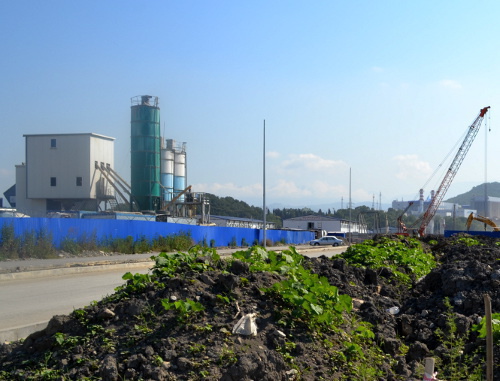
13 February 2014, 05:17
"EcoWatch": Sochi Olympics have caused irreparable damage to environment
The Winter Sochi Olympic Games had been planned not as a sporting, but as a commercial project; its goal being to capture the expensive land of the Black Sea shore, the activists of the "Ecological Watch for Northern Caucasus" ("EcoWatch" or EWNC) at the presentation of their report "Sochi-2014: Ten Years without Right to the Law: How They Built Better World", prepared with the assistance of the Greenpeace-Russia.
The report on the environmental consequences of the preparation of the city of Sochi for the 22nd Winter Olympic Games was presented at the Sakharov Centre in Moscow. The main author of the report is Suren Gazaryan, a Candidate of Biology, who was forced to leave Russia; he was granted political asylum in Estonia and now lives there.
The report is based own the studies conducted by the "EcoWatch" and on the data from open sources, which were collected and analyzed by the EWNC activists.
Alexei Yablokov, a Corresponding Member of the Russian Academy of Sciences (RAS) and a Member of the Board of the EWNC, said at the presentation that the Olympic movement has transformed into a commercial enterprise. He stressed that Evgeny Vitishko, knowing what he is under threat of criminal prosecution, deliberately would not emigrate, which "indicates his civil position of principle."
Mr Yablokov has treated the Olympic construction in Sochi as "unacceptable barbarity". "This is a consequence of the fact that some 15-17 years ago Russia embarked on the track of de-ecologization; that is, attracting investments by lowering the environmental requirements. The APEC summit in Vladivostok, the Boguchanskaya HPP and extraction of nickel near Voronezh – these are all major projects, which have caused enormous damage to the environment," said Alexei Yablokov.
He recalled that the Olympic construction has captured a part of the territory of Western Caucasus – a recognized global-significance centre of biodiversity.
Mikhail Kreindlin, the head of the programme on specially protected areas of the Greenpeace-Russia, has stated that the Sochi Olympiad threatens the entire system of Russia's protected areas, because for the sake of it they changed the national legislation.
Thus, according to his story, the government of the Volgograd Region, referring to the preparation for the upcoming Football World Cup, is trying to withdraw 17,000 hectares out of the National Park "Volga-Akhtuba Floodplain". In the Krasnoyarsk Region, where preparations are underway for the Winter Universiade-2019, local activists gathered 30,000 signatures against the plans to transfer the Reserve "Stolby" (Pillars) into the category of National Park.
As reported by Dmitry Shevchenko, the authors of the report have compared what had been promised by the authorities at the start of the construction as ecological compensations, and what has been made in reality.
"It appears that nothing has been done. In particular, the Olympic Park is now housed in the Imereti Valley. These are the unique Russia's Colchis subtropical swamps, where dozens of bird species had been nesting; and millions stopped at migration. Now, this area is covered by concrete. They promised that part of the valley will be preserved in its original status; and an ornithological park would be created there. In fact, instead of the park, just several fragmented territories remain," said Shevchenko.
A separate section of the report focuses on the mountain cluster. According to the authors, this area has been actively assimilated even before the Olympic construction. "It all started in 2003, when 'Gazprom' came there; then Mr Potanin with his 'Roza Khutor'; then, the administration of the Krasnodar Territory with the resort 'Mountain Carousel'; then, Bilalov brothers. Potanin said that there would be no tree felling, but to arrange ski slopes, they cut down dozens of hectares of virgin forest," said Shevchenko.
The combined road Adler-Krasnaya Polyana, routed along the left-hand bank of the Mzymta River, became the most expensive and the most destructive project of the 2014 Olympics, which has inflicted irreparable damage to the river ecosystems and landscapes, the authors of the report assert.
Speaking about their future actions, the authors said they would, firstly, seek a stop of the criminal prosecution and release of the activists; secondly, demand from the authorities to perform particular compensatory measures in Western Caucasus: to leave alone the Caucasian Biosphere Reserve, in particular to reject the plans of "resorts of Northern Caucasus" (building resorts in reserves), and expand the territory of the Caucasus Nature Reserve and the Sochi National Park.
The deterioration of the environmental situation in the region was announced, two weeks before the opening of the Olympics, by the Human Rights Watch.
Let us note here that Russian authorities and the International Olympic Committee (IOC) reject the accusations of degrading the environmental situation. The participants of the 10th World Conference on Sports and the Environment, held last October in Sochi, stated that the preparations for the 2014 Olympics were conducted in compliance with all environmental standards.
The "Caucasian Knot" has made a compilation of the most serious environmental problems associated with the Games. The below chronology is based on the materials of the "Caucasian Knot" correspondents for the period from 2006 to 2013.
Author: Natalya Kraynova Source: CK correspondent




